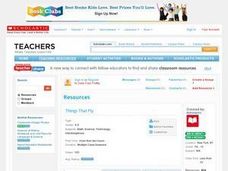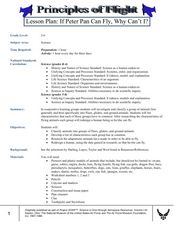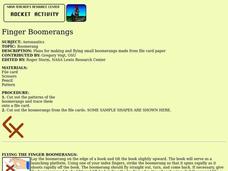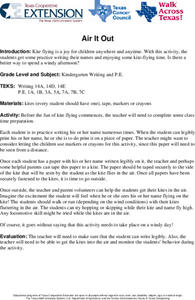Curated OER
Flying with Pythagoras
A lengthy narrative about Pythagoras and his students precedes an activity in which your young mathematicians practice using the Pythagorean theorem to solve three problems about flight and distance. Answers are provided.
Curated OER
The Art of Flying: Insects
Students study insects. They examine how insect wings operate and make a model airplane that mimics the way insect wings operate as the insect is flying. They compare and contrast different kinds of insect wings and color a page of...
Curated OER
Things That Fly
Students locate images of two things that fly on the Internet and print them. They develop graphic organizers to compare and contrast the two images and exhibit the images along with the organizers in a classroom gallery.
Curated OER
If Peter Pan Can Fly, Why Can't I?
Students redesign a human, using data in research, so that s/he can fly. In this flying lesson, students examine the characteristics and adaptations of groups of animals that can fly. Using this research, students work...
Curated OER
B-29 Frozen in Time
Learners view a video clip about members of a B-29 flying group. They complete a chart while viewing the video. They work together to develop ideas to help solve the crew's problems during flight. They share their ideas with the class.
Curated OER
Flight
Students are introduced to the four forces of flight--drag, lift, thrust, and weight--through a variety of fun-filled flight experiments. They "fly" for short periods and evaluate factors that might either increase or decrease their...
Curated OER
Pilots
Students read books, learn about the letter p, and have 'p' snacks all to learn about pilots. Students also pretend to fly and draw what they would see if they were flying up in the air.
Curated OER
Proportions in Flight
Sixth graders calculate wingspan and the body length of the birds and understand how they relate to how the bird flies. In this wingspan lesson plan, 6th graders also calculate their own "wing span" with their arms.
Curated OER
What's A Mammal?
Students examine mammals understanding what a mammal is and reviewing the eleven mammal groups. In this science lesson, students play a game known as Mystery Mammal Game. Yet, first students research about the mammal and then give...
Curated OER
Finger Boomerangs
Students construct boomerangs. In this aeronautics lesson, students use a file card, scissors, and pencil to develop their own boomerang.
Curated OER
Airplanes
Fourth graders experiment with gravity and lift by building paper airplanes. In this physics lesson, 4th graders compare the falling rate of a crumpled vs. flat sheet of paper. Then after class discussion and demonstration of Bernoulli's...
Curated OER
Kites of Japan
High schoolers perform research into the designs of Japanese kites in order to appreciate them for their aerodynamic designs. The appreciation builds student interest in order to produce their own similar designs.
Curated OER
Things That Fly
Students examine animals that can fly and discover that those animals need wind and wings to be able to leave the ground. They create a chart with two sides and they divide animals and objects that fly.
Curated OER
The "Wright" Puzzle
In this airplane worksheet, students complete a crossword puzzle by figuring out the answers to 12 questions about the flying machines created by the Wright Brothers.
Curated OER
Up Up and Away
In this technology activity, students find the words that are related to machines that fly and the answers are found through clicking the link found at the bottom of the page.
Curated OER
John J. Montgomery: Controlling flight
Students research the history of aviation while looking at how gliders and airplanes fly. This lesson is the perfect way to intertwine Science and History. It has variations for all grade levels K-12.
Curated OER
Wright Brothers Centennial: North Carolina, Creation and Development of the State
Eighth graders examine technological advances and how they influenced the quality of life in North Carolina. Using maps, they locate the city of Kitty Hawk and discuss why it was chosen for the first flight. They read primary source...
Curated OER
Air It Out
Students practice writing their names and print it in bold color ona piece of paper which is taped to a kite. They watch their names flying in the sky while running with their kites.
Scholastic
Scholastic: The Flight of Amelia Earhart
A lesson unit to help students in grades 4-8 learn about the life and disappearance of Amelia Earhart. The interactive timeline shows advances in technology and the world as a backdrop to Amelia's life.
TED Talks
Ted: Ted Ed: If Superpowers Were Real: Flight
Is it scientifically possible to fly? In this series, creator Joy Lin tackles six superpowers and reveals just how scientifically realistic they can be to us mere mortals. [5:11]
Smithsonian Institution
Smithsonian Learning Lab: How Things Fly: Activities for Teaching Flight
Through this series of three lessons, learners will gain an understanding of the basics of flight. They will learn about the four forces of flight and practice their observation skills through a number of fun experiments. In addition,...
Other
National Aviary: Curriculum: Wings to Fly
Richly illustrated interactive activity leads you through an investigation of bird wings. Includes interesting comparisons of the bones in a bird's wings with those in human arms and of the design of wings in birds versus planes.
Annenberg Foundation
Annenberg Learner: Journey North: American Robin
Use this resource to learn about Robins and track their migration. Information about Robin characteristics, life cycle, and migration. Includes migration map and the opportunity to report your sightings.
Smithsonian Institution
National Postal Museum: Fad to Fundamental: Airmail in America
A comprehensive site of the history of airmail in America.
























